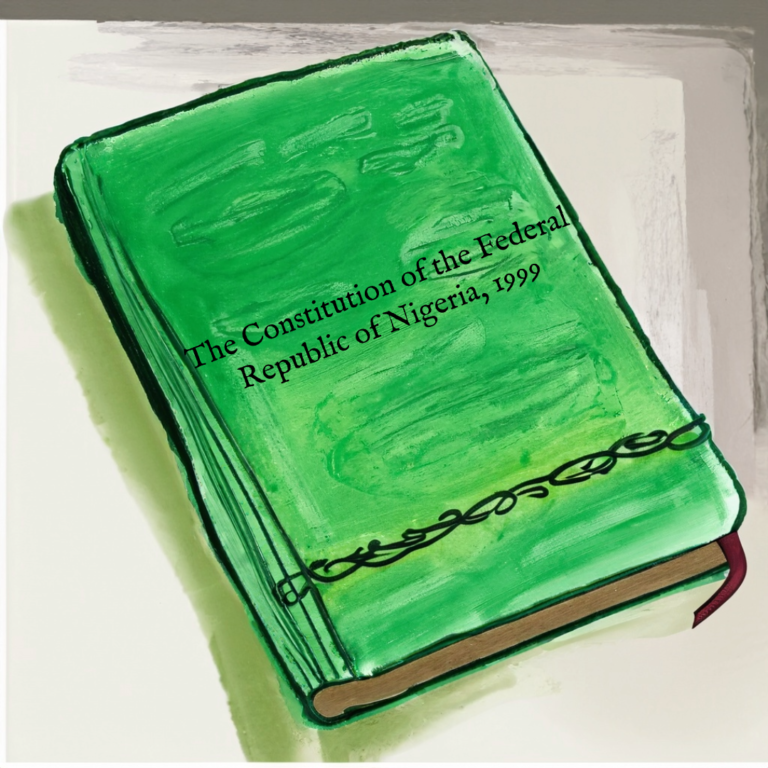This blog post is made possible by TARP Africa’s partnership with the Citizens Classroom.
The first section you read when you open the Constitution of the Federal Republic of Nigeria, 1999 (The 1999 Constitution), is section 1, and it provides:
(1) This Constitution is supreme and its provisions shall have binding force on all authorities and persons throughout the Federal Republic of Nigeria.
(2) The Federal Republic of Nigeria shall not be governed, nor shall any persons or group of persons take control of the Government of Nigeria or any part thereof, except in accordance with the provisions of this Constitution.
(3) If any other law is inconsistent with the provisions of this Constitution, this Constitution shall prevail, and that other law shall to the extent of the inconsistency be void.
Section 1 of The Constitution is not a greeting. It is a declaration and warning that debuted in Nigeria’s seventh Constitution (yes, seventh!), the Constitution of the Federal Republic of Nigeria, 1979 (The 1979 Constitution). For clarity, there has always been provision for the authoritative and foundational nature of The Constitution. Section 1 of The Nigerian (Constitution) Order-in-Council, 1960 (The 1960 Constitution), states:
This Constitution shall have the force of law throughout Nigeria and, subject to the provisions of section 4 of this Constitution, if any other law (including the [C]onstitution of a Region) is inconsistent with this Constitution, this Constitution shall prevail and the other law shall, to the extent of the inconsistency, be void.
That same provision was unaltered in The Constitution of the Federation 1963, No. 20 (The 1963 Constitution). Nonetheless, Constitutional supremacy seemed implicit under the 1960 and 1963 Constitutions. Conversely, section 1 (1) of the 1979 and 1999 Constitutions differ because they expressly declare the Constitution to be supreme. What happened that made section 1 of both the 1979 Constitution and the 1999 Constitution so aggressive? It is almost as if both Constitutions are snapping their fingers with an attitude and saying, “Don’t you dare!”
Nigerian Constitution as Product of History
It might be shocking to some people that Nigeria has had about eight Constitutions since it became a single country by the Amalgamation of 1914; they are:
- Nigeria (Constitution) Order-in-Council 1922 (Clifford’s Constitution)
- Nigeria (Constitution) Order-in-Council 1946 (Richard’s Constitution)
- Nigeria (Constitution) Order-in-Council 1951 (Macpherson’s Constitution)
- Nigeria (Constitution) Order-in-Council 1954 (Lyttleton’s Constitution)
- Nigeria (Constitution) Order-in-Council 1960 (Independence Constitution)
- The Constitution of the Federation 1963, No. 20 (The Republican Constitution)
- The Constitution of the Federal Republic of Nigeria, 1979
- The Constitution of the Federal Republic of Nigeria, 1999 (Current and altered five times)
(Honorary mention must be made of the Royal Instructions and Letters Patent that may loosely be called the 1914 Constitution and the Constitution of the Federal Republic of Nigeria, 1989, which went through rigorous processes of debates and drafting but never became operational. However, the 1989 Constitution influenced the drafting of the 1999 Constitution.)
These Constitutions listed have been influenced by historical, sociological, psychological, political and economic factors that ensure Nigeria’s continuous constitutional development. Meaning: the Nigerian Constitution, like other constitutions of the world, improves on itself by the factors mentioned. The following are phases of Nigeria’s constitutional development:
- Colonial rule – the 1st Republic (1914 – 1963)
- The 1st Republic – Military regime (1963 – 1979)
- Military regime – the 2nd Republic (1979 – 1983)
- The 2nd Republic – the Military Regime (1984 – 1993)
- Military regime – interim 3rd Republic (August 1993 – November 1993)
- Interim 3rd Republic – Military regime (November 1993 – May 29th 1999)
- Military regime – the 4th Republic (May 29th 1999 – date)
From the classification, it is clear that Nigeria went from colonial rule to independence and from independence to a back-and-forth between civilian and military governments. Therefore, it is a no-brainer that military leadership has had a lasting effect on constitutionalism in Nigeria, including the Supremacy of the Constitution.
Soldier Go, Soldier Come
The Constitution was suspended and modified every time military officers took over the administration of Nigeria. That does not mean that it ceased to exist, but that its existence was to the extent that it was not suspended or modified by a decree or an edict. Usually, parts of the Constitution that delegitimize the existence of a military government are suspended, including removing the jurisdiction of the Courts to determine certain rights and liabilities. Under a military government, the foundational and supreme law is:
- The Constitution (Suspension and Modification) Decree;
- Any Decree amending it, and
- Unsuspended sections of the Constitution of the Federal Republic of Nigeria.
Gem of History
The structure and wording of section 1 of the 1979 and 1999 Constitutions is a reaction to the disruptions caused by military interventions since the first coup on January 15th, 1966. Were it not for the experience of military rule, drafters of the 1979 Constitution would not have thought to draft section 1 in the manner they did, particularly section 1 (2), which is an express prohibition of military takeovers. Yet, we know from history that military governments did not end in 1979 but continued through the eighties and nineties.
An attempt at employing the Constitution – to further prohibit military intervention – was made by the 1988 – 1989 Constituent Assembly convened to give Nigerians a new Constitution. Members of the Constituent Assembly, representing several federal constituencies, voiced out their objection to military intervention, which A. N. Aniagolu (J.S.C.) noted in his book:
The feeling of members, almost to the last man or woman, against the military for their frequent intervention in the political governance of the country, was total. They called the military names; they opined that they were idle and corrupt and that they were more corrupt than the civilians whom they professed they had come to clean up. So vehement were they in their condemnation of the military that some members felt that the debate had been so slanted against the army that the army might intervene to rescue their good name… Divergent as the views of members were on issues before the House, one thing clearly emerged, that they were all at one condemning military coups d’etat and were agreed that some means must be found at stopping or curbing coups and that time should not be made to run to prevent the prosecution of the coup plotter, no matter how long it took the wheels of justice to catch up with [them] and adequately punish [them].
Aniagolu A. N., “The Making of the 1989 Constitution of Nigeria” (Ibadan: Spectrum Books Limited, 1993) pp. 22 – 23.
Consequently, they tried to strengthen section 1 by making military takeovers a crime. Clause 1 (4) of the Constituent Assembly Draft read:
Any take-over or control of government of Nigeria by any person or persons other than in accordance with the provisions of the present Constitution shall remain a punishable crime at all times under Nigerian law.
However, the Armed Forces Ruling Council (AFRC), headed by Major General Ibrahim Badamasi Babangida, removed that provision from the final draft. A second attempt to strengthen section 1 of the Constitution by making military coups a crime was made by the drafters of the 1995 Draft Constitution set up under the administration of General Sani Abacha, but that did not succeed.
Nonetheless, whether section 1 of the Constitution of the Federal Republic of Nigeria, 1999, is punitive or not, it remains the gem of history, a child of experience, and the wagging finger of the Nigerian people, telling themselves and any government that comes into existence that Nigeria – shall not be governed, nor shall she allow any person or group of persons take control of the Government of Nigeria in any manner, except by the methods prescribed in the Constitution. It is a testament to our evolving nationhood and ability to put in a foundational document our hopes and aspirations as we continue our journey as a nation. This is worthy of celebration and our protection as citizens.

Author – Citizens Classroom
CitizensClassroom is an independent and non-partisan ed-tech organisation that produces 100% free animated videos, podcasts, articles and educational resources to help make principles, theories and facts about three core subjects: Nigerian History, Literature and Government, accessible to everyone and everywhere.To learn more about Citizens Classroom and their projects, visit their website and follow them on Twitter and Facebook.

